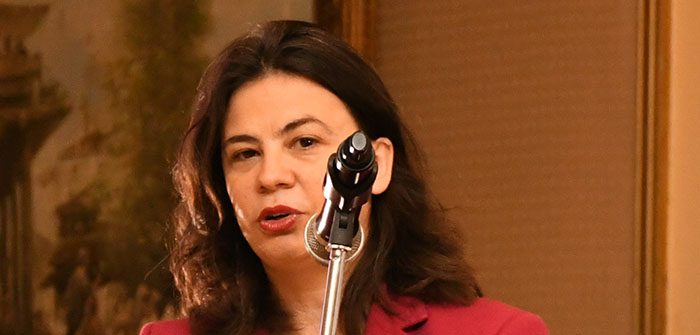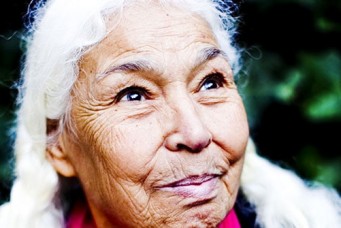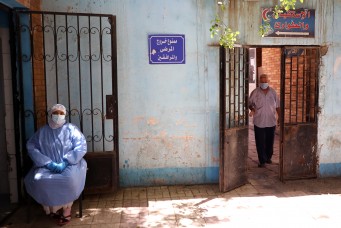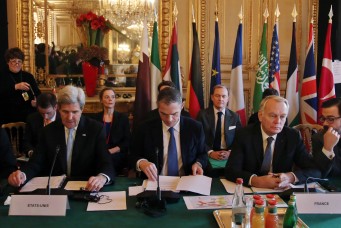“Our niche is to focus on the most vulnerable and marginalized”
The Cairo Review speaks to Blerta Aliko about how UN Women Egypt works to empower women socially, economically, and politically.

Blerta Aliko, Cairo, March 2018. Ahmed Hindy/UN Women
Blerta Aliko heads UN Women Egypt whose main objective is to empower women and reduce gender inequality. Appointed as the country representative in January 2018, Aliko brings over twenty-two years of experience to her position along with new perspectives on how to transform intersecting gender-related issues in Egypt. Most recently, Aliko held the position of deputy regional director for the UN Women Regional Office for Arab States in Cairo, and prior to that has worked with other UN development and humanitarian programs, including UNDP and UNICEF. On April 11, Aliko spoke to the Cairo Review about UN Women Egypt, and how it works closely with the government, civil society organizations, private sector, multilateral partners, and the wider public to empower women socially, economically, and politically.
CAIRO REVIEW: How has your background impacted your approach to UN Women Egypt?
BLERTA ALIKO: What I bring to this position is an in-depth understanding of the context and the unique added-value of UN Women. In order to assist the enhancement of policy and programs supporting women’s rights in Egypt, it is crucial to understand the potential to influence that UN Women has as an organization. UN Women Egypt has a technical niche, a strong national team of experts and a position in the multilateral partner arena, but we also recognize that there is more that we can do to maximize the organization’s potential.
CAIRO REVIEW: What are some of the development projects you are working on?
BLERTA ALIKO: We are currently working on three focus areas. The first area focuses on increasing women’s participation and leadership, particularly through increasing women’s citizenship rights by providing women with ID cards. The possession of ID cards is crucial to exercising citizenship rights, such as the right to vote, work, access services and participate in society. As a result, we have supported the issuance of approximately 450,000 ID cards to women across Egypt.
The second focus is on women’s economic empowerment, which begins with giving marginalized women financial literacy training. UN Women Egypt works with the private sector to engage women who usually work in the informal sector, and employ them in the agriculture labor force through fixed-term contracts, ensuring social security and providing training. And through a project called “One Village One Product,” UN Women Egypt supports communities where women are known to produce a particular product by giving them a comparative advantage that would increase the product’s access to market and, in turn, the profit margin of the women’s enterprises.
The third focus area is ending violence against women. As part of the global “Safe Cities” program, UN Women Egypt is renovating spaces, including creating areas that women can access freely and safely to create commercial enterprises.
CAIRO REVIEW: Female genital mutilation is an issue women face across this region. How has this issue been understood and dealt with from the policy perspective in Egypt?
BLERTA ALIKO: Egypt has managed to decrease female genital mutilation in the younger generations from 74 percent to 61 percent. The penalty for female genital mutilation has now increased to a sentence of up to seven years in prison. Combatting female genital mutilation is also part of a social movement led by a variety of influencers such as women’s rights advocates, doctors, and religious scholars, among others influencing Egyptian families to stop the practice. The movement on combating female genital mutilation in Egypt drove decision makers in Egypt to place it on the national agenda of the Egyptian government, launching the “National Strategy and Program Against Female Genital Mutilation.”
It is widely recognized that women themselves play a critical role in perpetuating the female genital mutilation practice against their own young daughters. Therefore, I believe their further empowerment, education, and access to employment would have a strong impact on preventing and reducing the practice of female genital mutilation. Role models too are critical as they have a positive and pivotal influence on the mass population.
CAIRO REVIEW: You worked in Liberia, Myanmar, Haiti and Yemen, can you elaborate on how the challenges in Egypt differ from these areas you have dealt with in your career?
BLERTA ALIKO: Every context is different and as a professional it is your responsibility to learn and understand your own professional and personal environment. With regards to women’s empowerment, what is important is to understand the root causes of the marginalization of women and why patriarchal repressive norms continue, and to be able to find effective strategies for reducing gender inequality. Our niche is to focus on the most vulnerable and marginalized. That is where we need to support this segment of women, in order to have inclusive communities, more developed communities, and more progressive households.
In Egypt’s context, for example, we have one of the most progressive constitutions promoting women’s rights, as well as a very solid National Strategy on women’s empowerment demonstrating the political will from the government to advance women’s rights as the accelerator for Egypt’s sustainable development.
CAIRO REVIEW: What initiatives do you hope to accomplish?
BLERTA ALIKO: One of our objectives is to increase efforts to tackle violence against women, be it domestic violence or sexual harassment in public spaces—considering how crucial the prevalence of violence against women is as a fundamental development indicator. Secondly, we aim to champion and create opportunities for inclusive development. By “inclusive” I mean a significant increase of women in the job market and their financial inclusion. We need to make sure that the employability of women does not come at the expense of women being discriminated against in the job market.
Furthermore, we also have upcoming local council elections. The constitution grants women 25 percent of seats in the local councils. This means that more than 25,000 seats can be occupied by women. Egyptian women need to take hold of those seats, but we need to work very hard to support them and support their capacities when exercising their functions. Women will be judged on how they will be performing, which is why performing in positions effectively—by not only filling seats with women—will be important. We are convinced that if we have very strong, capable candidates and we support them appropriately, our local development plans will prioritize gender equality, and will be more gender responsive.
This interview has been edited for clarity.
Subscribe to Our Newsletter





